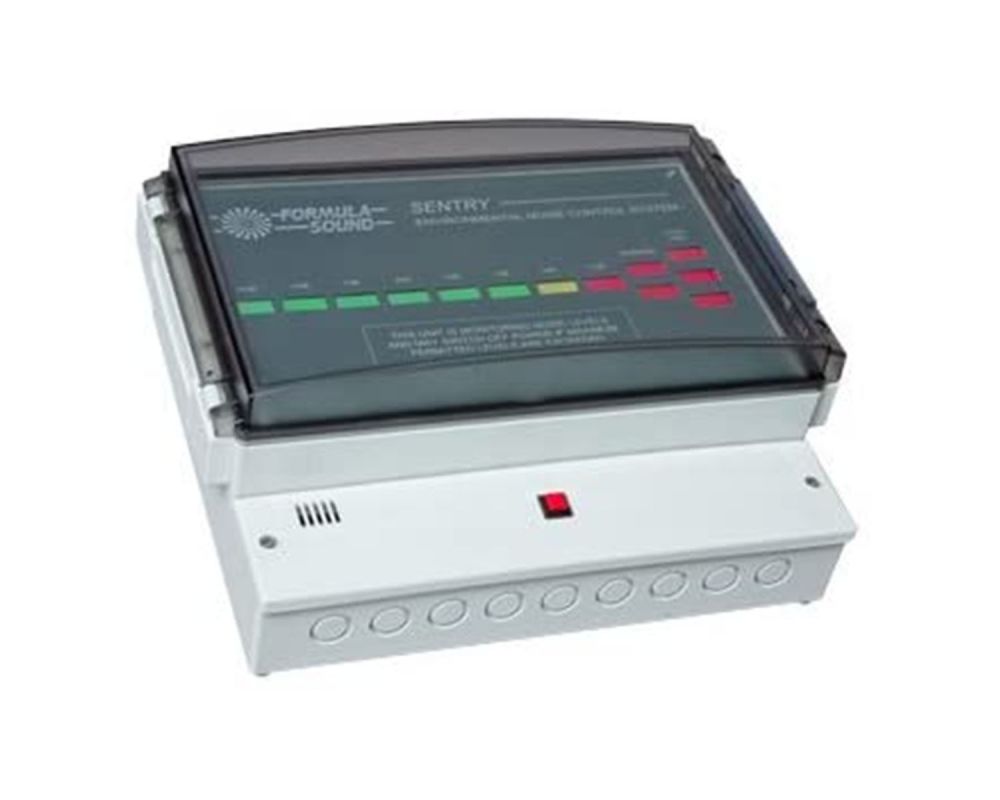Big Town Boppers // Professional Covers Band
BIG TOWN BLOGGERS
Fresh from the brains of the Boppers, delivered to your eyeballs!
|
One of the biggest issues we run into at wedding venues is sound limiters – and while we always manage to work with these devices and the venues that have them, we really need to talk about them… Because it seems like most venues aren’t even telling their clients about them! What is a sound limiter? A sound limiter at a venue typically looks like this: .
We see this particular model most often. A sound limiter is a device that listens for loud sounds. You can spot them on walls near performance areas in venues, usually near the ceiling. Sound limiters have a display to show when sounds are approaching a preset sound limit, measured in decibels (dB). The limit can be set anywhere, but a common number we see is 95dB. Decibels are a funny way to explain sound, but we won’t bore you with the technical stuff. Let’s just say that 95dB is about as loud as you using a handheld power drill, from your perspective, and a baby cries at about 100dB when they’re really giving it some. Anyway – the display has coloured segments to show how loud the sound is getting. If it’s in the green, then it’s all good. If the yellow light shows, it means you’re approaching the sound limit but still safely within it. Red, as with most displays, means bad – and if you’re in the maximum for too long, the sound limiter will trigger. So, what happens when it’s triggered? The sound limiter is connected to the electric plug sockets, and it cuts the power. Instantly. Usually, this only affects the plugs in the performance area, but we’ve been in some venues that have theirs wired into everything. Not a smart move, but who are we to judge?! By cutting the power, the loud sound is stopped. To power up again, the limiter has to be reset – and this needs someone to reactivate it. At a busy venue, this can take anywhere from a few seconds to a few minutes. But when the music suddenly dies, those seconds might as well be hours. Total vibe-killer! So why do venues install them? Why do venues have sound limiters? UK noise level restrictions are strict. Licensing rules near housing can be even stricter. Noise complaints in the UK can get venues shut down, which is terrible for all of us, but it’s happening more and more often as we’re crammed into ever-denser living situations. Councils enforce these rules under section 80 of the Environmental Protection Act 1990, which is a chore to read, but boils down to this: If a venue doesn’t stick to the rules on noise, it can be fined heavily. It can be legally shut down, with any sound-producing equipment it owns seized by the local authority – without notice. Wedding venues don’t want to risk losing their licences, or being shut down altogether – so they don’t really have much of a choice. They install limiters to stay on everyone’s good side, but in doing so, they need to be transparent to their clients. Unfortunately, they almost never are. Rule #1 for couples looking at wedding venues, who want live music: ask the venue if they have a sound limiter. Even if they do tell you, you’ll likely get something along the lines of: “Oh yes, we do have a sound limiter, for the neighbours. But we have bands in here all the time – it’s never a problem!”. Dear reader: it is always a problem. So why won't they explain them properly? Maybe they usually have quiet bands, or don’t understand the ins and outs of sound limiters? Nope! They know exactly what they’re doing. And we know, because we talk to them. Basically, they don’t want to lose your business. They want to have their cake and eat it. We think that sucks. They’re willing to do it at the expense of your special day. The day you’ve spent thousands of pounds on, with them alone. The day you’ve spent hundreds of hours planning, calling around for, doing odd jobs for. A day you want to remember forever, for all the right reasons. We know most of our local venues by name now, and what their limiters are like. And to be fair, we know some amazing – AMAZING – establishments, run by people who genuinely care about all aspects of your day; from the meals to the music. But for every venue that cares and goes the extra mile, there are 2 that don’t. And these are where we run into problems. The problems sound limiters can causeIn all the years we’ve been doing live music and live sound, we have played with countless sound limiters. Most have been fine to work with, some have been manageable, others have been borderline impossible to work with. We have only ever had one total nightmare, which we still managed to rescue from with some quick thinking. But not knowing about them in advance can seriously alter how the night goes – and can change a live music performance drastically. For example, if a sound limit is very low, we can bring electric drums (which are much quieter than acoustic drums) and compensate with an overall lower level for everyone else in the band, too. If we don’t know about it, we can’t accommodate for it, and will have to adjust our performance – and the energy we put out. And this will impact the energy of your wedding party. But even with a reasonable sound limit, a poorly installed or set up sound limiter ruins everything, even if we make every effort to accommodate it. Sometimes, limiters are installed too close to performance areas, or are not set up to the right limit – and this just makes things harder. The biggest issue is always bass: the low sounding, big, boomy part of music. Basically, the fun bit! Bass To say that bass is an important part of live music is an understatement. It physically moves you, and provides most of the danceable energy of a song. Without it, music can sound weak, thin, lifeless. Sadly though, it’s the thing that bothers sound limiters the most. To stay within the lines, bass levels have to be cut dramatically when working with a sound limiter. There are some tricks we’ve learned to cope with this, but it’s always a compromise. Audience participation If your wedding party is absolutely poppin’, the audience can add 5-6dB to the mix. If we’re playing a belting singalong, the sound limiter can trip the power off at the most fun part. Acoustic drums Drums are everything in live music. And acoustic drums are unbeatable for the quality and power of their sound. With heavy-handed sound limiters, we have to use an electric drum kit. They just don’t have the same feel to the player or the audience, and can get lost in a band quite easily. So – if your venue has a limiter, should you still hire a band of live musicians? What to do if your venue or the venue you want has a limiter
The bottom line Most people want music at their weddings, and most wedding venues have noise pollution policies to deal with. By understanding venues and clients, and working together to solve issues, we can get through even the strictest noise restrictions. But venues need to know when to stop. We played a wedding at a barn once that demanded use of their electric drums, use of their sound system only, and gave a strict set of guidelines for live musicians – because they were on their final warning from the local authority. We did everything they asked, and they still got complaints. Venues, if this is you… Just stop already. Stop allowing wedding parties to have live music. It’s not fair to your neighbours, your clients, or to the musicians they have hired. We all have jobs to do, and bills to pay. But if you can’t do the job… Should you deserve to get it? Well, that’s our two pence. If you do have a venue with a limiter, and want a band to play, give us a call and we’ll talk through the ins and outs with you – and give you the lowdown from our perspective. BIG TOWN BOPPERS Big Town Boppers is an award-winning wedding band and professional covers band. Hire musicians experienced in working with sound limiters at venues: 👉book live music.
0 Comments
Your comment will be posted after it is approved.
Leave a Reply. |


